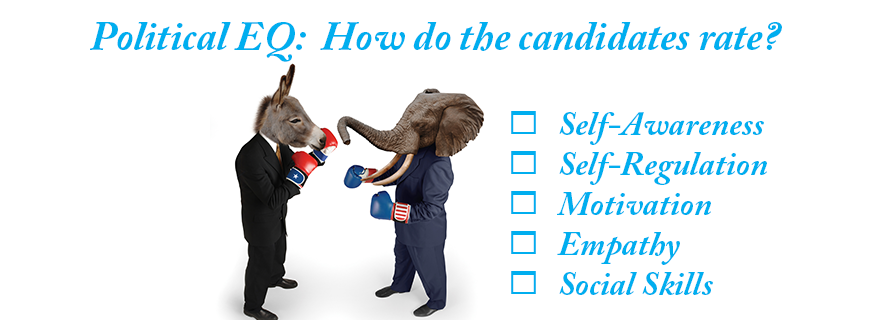Politics and Emotional Intelligence

Do you think “politics” and “emotional intelligence” are oxymorons? Lately, there has been a LOT of talk, argument, and conflict regarding the Presidential campaigns. I have had people tell me why “their” candidate is the best. And, many people have been sharing how disappointed they are in all the candidates. While I don’t really like to talk about politics, especially during an election year, I, too, have had to look at the people running for President, and try to see through the rhetoric and acting and try to pick someone I think (and hope) will do a good job leading our country. Now, I won’t say if I’ve made a decision, but I would like to share some thoughts about how to choose anyone who runs for public office.
Leadership is leadership.
Whether running a small company, a city, or the free-world, having a good leader is the key to success. So, what makes a good leader? Is it their education? Their family tree? Does age and experience count for anything? Research has shown that great leaders are high in EQ. So, let’s review how that applies to an election.
Since few people truly know any of the candidates personally, making it difficult to determine whether what we hear on TV is really how they think and act, we have to look at the interviews, debates, and speeches and see if we can identify where they may be strong and weak in regards to Emotional Intelligence.
As you know, Emotional Intelligence (EQ/EI) has five main dimensions: Self-Awareness, Self-Regulation, Motivation, Empathy, and Social Skills. Look at each one and see how the candidates stack up.
- Self-Awareness: The ability to recognize and understand our moods, emotions, and drives, as well as their effect on others. Someone who is low in self-awareness often comes across as a bully, defensive, and controlling. They make excuses and blame others, and are often over-the-top in how they present themselves and their ideas.
- Self-Regulation: The ability to calm yourself down when you’re upset, and cheer yourself up when you’re down. Someone low in self-regulation may act impulsively rather than thinking before acting. They let people push their buttons and often react disruptively. Conversely, leaders with high self-regulation are generally flexible, and able to adapt their style to work well with others. They keep calm under pressure, and don’t get too concerned about negative feedback.
- Motivation: Having clear goals and a positive attitude, and being able to defer immediate results for long-term success. A motivated leader is not only driven to achieve, they inspire others to stay motivated. Motivated leaders have a deep passion for their work, and seek out creative challenges. These leaders are open to try new approaches, and are able to stay optimistic even in difficult times.
- Empathy: The ability to communicate and lead by understanding others’ thoughts, views, and feelings. Basically, someone with strong empathy has the ability to “put themselves in someone else’s shoes.” Empathetic people are good listeners. They are open to other people’s point of view, and try to understand different ideas and positions. When someone is low in empathy they aren’t likely to interact well with others because they are too focused on their own ideas, beliefs, and experiences and usually feel their way is the “right” way.
- Social Skills: The ability to develop good interpersonal relationships in your professional and personal life. Having good social skills isn’t about going to numerous events and being the “star,” in fact, it’s just the opposite. When a leader has good social skills, they are a true team player. They help others develop and succeed, and are good at managing problems and disputes. People with good social skills are collaborative, and are usually great at building and leading teams.
So, how do you think the candidates rate in each area? While we may not truly know the candidates, if we watch and listen to how they handle themselves in the debates, their TV and radio ads, interviews, and in public, we can probably get an idea of where their strengths and weaknesses are in relation to Emotional Intelligence. I look for someone who is the closest to being balanced in all five areas – but, without actually doing an EQ Assessment, it’s still an educated guess. Of course, if any of the Presidential candidates would like an EQ Assessment I would be happy to work with them!
Happy voting!

